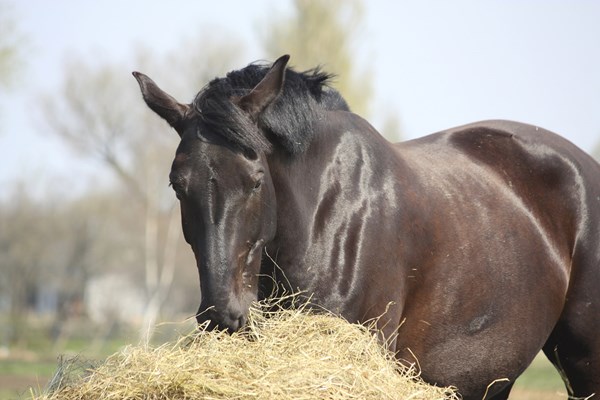 Credit: Thinkstock A distended abdomen is often referred to as a “hay belly” to describe an overweight horse, even when the rest of his body is normal, but actual fat does not accumulate extensively on the horse’s lower abdomen (belly).
Credit: Thinkstock A distended abdomen is often referred to as a “hay belly” to describe an overweight horse, even when the rest of his body is normal, but actual fat does not accumulate extensively on the horse’s lower abdomen (belly).Ever been told that your horse has a hay belly and needs to lose weight? Well, relax! He’s not fat, he just has gas! In fact, gas production is normal and healthy. It indicates that your horse is getting enough hay for hindgut microbial fermentation to occur.
A distended abdomen is often referred to as a “hay belly” to describe an overweight horse, even when the rest of his body is normal, but actual fat does not accumulate extensively on the horse’s lower abdomen (belly).
Horses do accumulate worrisome fat in specific areas: neck, withers, back, ribs, shoulders and tailhead. Excessive fat in these areas increases a risk for laminitis and increased inflammation throughout the body. In 1984, Dr. Don Henneke, of Texas A&M University, developed a “body condition scoring system” that categorizes horses’ condition based on the amount of fat stored in these six areas. This system is still the mainstay for equine health professionals.
Horse owners who deliberately limit hay consumption and replace it with cereal grain to avoid a hay belly are doing their horses a disservice and are increasing the risk of digestive and metabolic disorders. Forage should be the foundation of any horse’s diet. It is vital for the health of the hindgut microbes, and hence, the health of your horse.
Juliet M. Getty, PhD, is an internationally respected, independent equine nutritionist who believes that optimizing horse health comes from understanding how the horse’s physiology and instincts determine the correct feeding and nutrition practices. She is available for private consultations and speaking engagements. Getty’s website, www.GettyEquineNutrition.com, offers a generous stock of free, useful information for the horseperson. Sign up for her free monthly newsletter, Forage for Thought; browse her library of reference articles; search her nutrition forum; and purchase recordings of her educational teleseminars. Reach Getty at gettyequinenutrition@gmail.com.


